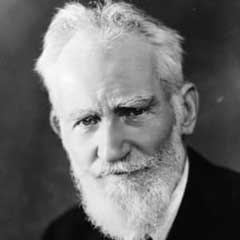
by George Bernard Shaw
Extracts:
Joan of Arc, a village girl from the Vosges, was born about 1412; burnt for heresy, witchcraft, and sorcery in 1431; rehabilitated after a fashion in 1456; designated Venerable in 1904; declared Blessed in 1908; and finally canonized in 1920. She is the most notable Warrior Saint in the Christian calendar, and the queerest fish among the eccentric worthies of the Middle Ages. Though a professed and most pious Catholic, and the projector of a Crusade against the Husites, she was in fact one of the first Protestant martyrs. She was also one of the first apostles of Nationalism, and the first French practitioner of Napoleonic realism in warfare as distinguished from the sporting ransom-gambling chivalry of her time. She was the pioneer of rational dressing for women, and, like Queen Christina of Sweden two centuries later, to say nothing of Catalina de Erauso and innumerable obscure heroines who have disguised themselves as men to serve as soldiers and sailors, she refused to accept the specific woman's lot, and dressed and fought and lived as men did.
As she contrived to assert herself in all these ways with such force that she was famous throughout western Europe before she was out of her teens (indeed she never got out of them), it is hardly surprising that she was judicially burnt, ostensibly for a number of capital crimes which we no longer punish as such, but essentially for what we call unwomanly and insufferable presumption. At eighteen Joan's pretensions were beyond those of the proudest Pope or the haughtiest emperor. She claimed to be the ambassador and plenipotentiary of God, and to be, in effect, a member of the Church Triumphant whilst still in the flesh on earth. She patronized her own king, and summoned the English king to repentance and obedience to her commands.
She lectured, talked down, and overruled statesmen and prelates. She pooh-poohed the plans of generals, leading their troops to victory on plans of her own. She had an unbounded and quite unconcealed contempt for official opinion, judgment, and authority, and for War Office tactics and strategy.
Had she been a sage and monarch in whom the most venerable hierarchy and the most illustrious dynasty converged, her pretensions and proceedings would have been as trying to the official mind as the pretensions of Caesar were to Cassius. As her actual condition was pure upstart, there were only two opinions about her. One was that she was miraculous: the other that she was unbearable.
JOAN AND SOCRATES
If Joan had been malicious, selfish, cowardly, or stupid, she would have been one of the most odious persons known to history instead of one of the most attractive.
If she had been old enough to know the effect she was producing on the men whom she humiliated by being right when they were wrong, and had learned to flatter and manage them, she might have lived as long as Queen Elizabeth. But she was too young and rustical and inexperienced to have any such arts.
When she was thwarted by men whom she thought fools, she made no secret of her opinion of them or her impatience with their folly; and she was naive enough to expect them to be obliged to her for setting them right and keeping them out of mischief.
Now it is always hard for superior wits to understand the fury roused by their exposures of the stupidities of comparative dullards. Even Socrates, for all his age and experience, did not defend himself at his trial like a man who understood the long accumulated fury that had burst on him, and was clamoring for his death.
His accuser, if born 2300 years later, might have been picked out of any first class carriage on a suburban railway during the evening or morning rush from or to the City; for he had really nothing to say except that he and his like could not endure being shewn up as idiots every time Socrates opened his mouth. Socrates, unconscious of this, was paralyzed by his sense that somehow he was missing the point of the attack. He petered out after he had established the fact that he was an old soldier and a man of honorable life, and that his accuser was a silly snob. He had no suspicion of the extent to which his mental superiority had roused fear and hatred against him in the hearts of men towards whom he was conscious of nothing but good will and good service.
CONTRAST WITH NAPOLEON
If Socrates was as innocent as this at the age of seventy, it may be imagined how innocent Joan was at the age of seventeen. Now Socrates was a man of argument, operating slowly and peacefully on men's minds, whereas Joan was a woman of action, operating with impetuous violence on their bodies. That, no doubt, is why the contemporaries of Socrates endured him so long, and why Joan was destroyed before she was fully grown. But both of them combined terrifying ability with a frankness, personal modesty, and benevolence which made the furious dislike to which they fell victims absolutely unreasonable, and therefore inapprehensible by themselves. Napoleon, also possessed of terrifying ability, but neither frank nor disinterested, had no illusions as to the nature of his popularity. When he was asked how the world would take his death, he said it would give a gasp of relief.
But it is not so easy for mental giants who neither hate nor intend to injure their fellows to realize that nevertheless their fellows hate mental giants and would like to destroy them, not only enviously because the juxtaposition of a superior wounds their vanity, but quite humbly and honestly because it frightens them.
Fear will drive men to any extreme; and the fear inspired by a superior
being is a mystery which cannot be reasoned away. Being immeasurable it
is unbearable when there is no presumption or guarantee of its benevolence
and moral responsibility: in other words, when it has no official status.
The legal and conventional superiority of Herod and Pilate, and of Annas
and Caiaphas, inspires fear; but the fear, being a reasonable fear of
measurable and avoidable consequences which seem salutary and protective,
is bearable; whilst the strange superiority of Christ and the fear it
inspires elicit a shriek of Crucify Him from all who cannot divine its
benevolence. Socrates has to drink the hemlock, Christ to hang on the
cross, and Joan to burn at the stake, whilst Napoleon, though he ends
in St Helena, at least dies in his bed there; and many terrifying but
quite comprehensible official scoundrels die natural deaths in all the
glory of the kingdoms of this world, proving that it is far more dangerous
to be a saint than to be a conqueror. Those who have been both, like Mahomet
and Joan, have found that it is the conqueror who must save the saint,
and that defeat and capture mean martyrdom. Joan was burnt without a hand
lifted on her own side to save her. The comrades she had led to victory
and the enemies she had disgraced and defeated, the French king she had
crowned and the English king whose crown she had kicked into the Loire,
were equally glad to be rid of her.
WAS JOAN INNOCENT OR GUILTY?
…
Let us be clear about the meaning of the terms. A genius is a person who, seeing farther and probing deeper than other people, has a different set of ethical valuations from theirs, and has energy enough to give effect to this extra vision and its valuations in whatever manner best suits his or her specific talents. A saint is one who having practised heroic virtues, and enjoyed revelations or powers of the order which The Church classes technically as supernatural, is eligible for canonization. If a historian is an Anti-Feminist, and does not believe women to be capable of genius in the traditional masculine departments, he will never make anything of Joan, whose genius was turned to practical account mainly in soldiering and politics.
…
JOAN'S SOCIAL POSITION
…
Joan was absolutely illiterate. 'I do not know A from B' she said. But many princesses at that time and for long after might have said the same. Marie Antoinette, for instance, at Joan's age could not spell her own name correctly. But this does not mean that Joan was an ignorant person, or that she suffered from the diffidence and sense of social disadvantage now felt by people who cannot read or write. If she could not write letters, she could and did dictate them and attach full and indeed excessive importance to them. When she was called a shepherd lass to her face she very warmly resented it, and challenged any woman to compete with her in the household arts of the mistresses of well furnished houses. She understood the political and military situation in France much better than most of our newspaper fed university women-graduates understand the corresponding situation of their own country today.
…
JOAN'S VOICES AND VISIONS
…
The test of sanity is not the normality of the method but the reasonableness of the discovery. If Newton had been informed by Pythagoras that the moon was made of green cheese, then Newton would have been locked up. Gravitation, being a reasoned hypothesis which fitted remarkably well into the Copernican version of the observed physical facts of the universe, established Newton's reputation for extraordinary intelligence, and would have done so no matter how fantastically he had arrived at it. Yet his theory of gravitation is not so impressive a mental feat as his astounding chronology, which establishes him as the king of mental conjurors, but a Bedlamite king whose authority no one now accepts. On the subject of the eleventh horn of the beast seen by the prophet Daniel he was more fantastic than Joan, because his imagination was not dramatic but mathematical and therefore extraordinarily susceptible to numbers: indeed if all his works were lost except his chronology we should say that he was as mad as a hatter. As it is, who dares diagnose Newton as a madman?
In the same way Joan must be judged a sane woman in spite of her voices because they never gave her any advice that might not have come to her from her mother wit exactly as gravitation came to Newton. We can all see now, especially since the late war threw so many of our women into military life, that Joan's campaigning could not have been carried on in petticoats. This was not only because she did a man's work, but because it was morally necessary that sex should be left out of the question as between her and her comrades-inarms. She gave this reason herself when she was pressed on the subject; and the fact that this entirely reasonable necessity came to her imagination first as an order from God delivered through the mouth of Saint Catherine does not prove that she was mad.
…
May 1924
LINKS:
Full
text of the above Preface to Saint Joan, by George Bernard Shaw.


